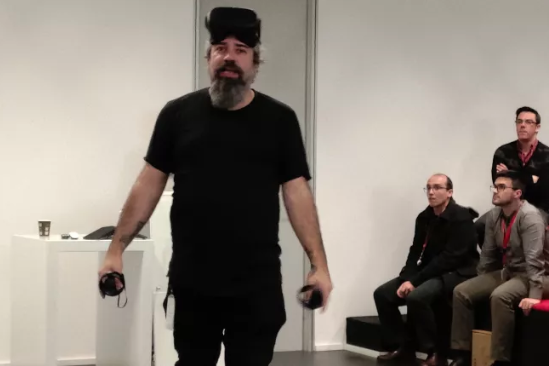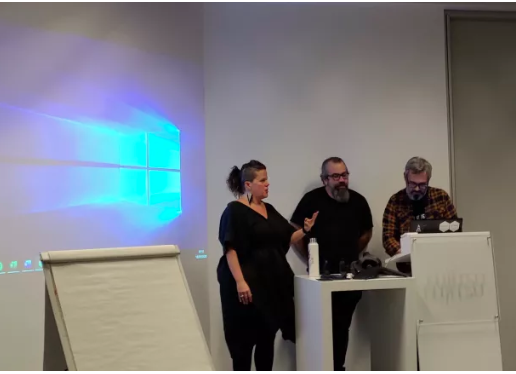Apply to speak, exhibit, sponsor and get tickets here for the VR/AR Global Summit Europe in Libson!!
The annual North America event expands for the first time around the world and Lisbon was chosen to speak about virtual and augmented reality!
Despite the connotation of virtual reality to video games and entertainment experiences, technology is increasingly a tool for creating technological solutions implemented in the B2B market. As technology has evolved, becoming more powerful, less expensive and freeing itself from the cables that attached them to computers, VR and augmented reality headsets are solving problems in people's lives and helping companies with their digital transformation.
Tiago Loureiro demonstrates an application that creates a virtual meeting room.
In the training area, where it is impossible to have a specialized technician to train new employees, everything can be done remotely, physically away, but virtually in the same room. And whoever speaks in teaching, it can be a qualified technician or a doctor giving precious instructions through a non-physical presence .
VR / AR Global Summit to be held in Lisbon in June
Portugal already has an association, or rather, it is one of the chapters of the VR / AR Association (VRARA), an ecosystem that brings together people, start-ups and companies to create innovative solutions in virtual and augmented reality for business application. VRARA is considered the largest association of virtual and augmented reality, with 4,500 companies, brands and schools and over 29K professionals registered. Its function is to create guides for the best practices in the use of AR / VR technology. Its members come from all areas, not exclusively technological, to support the creation of value for the community, which include meetings between producers and technology enthusiasts.
In Portugal, the association led by Tiago Loureiro, one of the Portuguese gurus in matters of virtual reality, current senior developer at Exit Games (company that created the Photon multiplayer engine); and Luís Bravo Martins, from IT People Group, promotes monthly meetings, giving the voice to its members when presenting projects and exchanging ideas and knowledge.
It was mentioned that there are more than 85 companies in Portugal creating AR / VR projects. However, Portugal is still considered a second-tier country, and therefore, according to Luís Bravo Martins, it is necessary to work to gain recognition abroad.
This week a very special meeting was held at Fujitsu's “home” in Colombo (which also has an AR solution developed for EDP), to officially announce the arrival in Portugal of the VR / AR Global Summit event that is held annually in Vancouver, Canada. The collider of the VR / AR Association and organizer of the technological event, Anne-marie Enns, was present to reveal a little more than can be expected in this first edition out of doors. The event will take place at the LX Factory during 1-2 June in anticipation of the 2020 edition of Vancouver, to be held on 17-18 September.
Anne-marie Enns, Tiago Loureiro and Luís Bravo Martins of the VR / AR Association.
Anne-marie Enns highlights the experiences that small producers and companies are doing, and 500 companies are expected to participate in this first year in Portugal. There will be a pitch contest, whose companies can register from March, with cash prizes. “We are very excited to bring this event from Vancouver to Lisbon”. The ticket price will be 199 euros for non-members, and about 99 euros for members, values yet to be confirmed. The event was scheduled to take place in Lisbon last year, but not all the necessary conditions were met, being postponed to 2020.The organization is also open to speakers who have stories and experiences about AR / VR technology. Those interested can apply, undergoing filtration, cured directly by Anne-marie Enns. Luís Bravo Martins shared his experience in Vancouver last year, highlighting the environment of uncompromised conversations, but highly focused on looking for business opportunities. There are also the so-called Speed Dates, in which the participants have an opportunity to exchange impressions, for a maximum of three minutes, with other people connected to the technology.
During the presentation in Portugal, SAPO TEK had the opportunity to talk to Anne-marie Enns about the event and the state of AR / VR technology.
What is your background and how did you get in touch with AR / VR technology, as well as the idea for the event?I was an event producer for 20 years, but in 2012 I made contact for the first time with technology in general with the production of a big hacking meet up in Vancouver. After that, I was offered a place in the production of a VR consumer event in 2016, with a company called Archiact in Vancouver, which I was connected to for two years. After that we worked to transform the event into something more focused on companies, more focused on B2B than on consumption, which is what we have been doing for the last four or five years at the VR / AR Global Summit.
Why a more focused B2B focus?
When we did the first consumer event, VR was something new. So we had about 5 or 10,000 people at the event, who had never experienced VR. The first two years were very good, but then we felt that we were dying, as it was no longer new, in addition to the fact that the content and video games were not keeping up with technological developments. So Archiact decided not to hold this event anymore, focusing only on producing VR games.
With your blessing, I took the idea and turned it into what is currently the VR / AR Global Summit, a business event. And it became very popular, even though games and entertainment were not excluded, but it also had hardware, solutions, software, immersive art, education, training, and others, covering almost the entire spectrum. In the last year we have had user cases, good practices, how to use technology to practice good actions, bringing renowned companies and organizations, such as NASA, to the event.
Do you have any idea how much the AR / VR market can currently be worth?
I don't have the exact numbers, and I don't want it to be badly recorded, but at the last event in Vancouver, we noticed a big difference with the launch of Oculus Quest, with a large number of people using and showing business user cases, because it is wireless he sees. The price of the equipment has also gone down, which facilitates its access. There are many solutions in the training area, but there are also many video game producers who have switched to the business side of training, because it is the business where the money is. They say that the industry can become multibillion-dollar and create thousands of jobs.
Do you think technology is still in its infancy?
It all depends on where you are. It is funny that Portugal has been at the level of Vancouver for five years, but much more creative. Vancouver is the second largest technological ecosystem in the world, behind San Francisco, but although it is not exempt from its problems, it has seen a large government investment. There are countries like Portugal, which are starting to open innovation hubs and train people, and to bring universities on board, so they have a greater advantage than starting from scratch.
Portugal has already started to invest and has more advantages than other companies in Europe, due to the low cost of living, innovations, and it is important to show these projects on global stages, what they have to offer. It is like the Vancouver event, which showed the world what local businesses and start-ups had to offer.
And why did you choose Lisbon for the event, it is the first city outside Vancouver?
Yes it is the first and I chose Lisbon for several reasons. The culture and innovation here is fantastic, creativity is magic. There are so many things being done here that you don't even dream of in North America, and are far ahead of other places. It is also a very beautiful destination to attract people, very appealing. There are many events taking place in northern Europe or in Germany and the Netherlands, but there is something magical happening here. There are already made products here, but also pitches with good ideas.
For you, what is the practical future of AR / VR systems?
It will be quite common when training people. I have seen it used a lot in education and in the medical field. It will be interesting to see distance training in the future, even if people need that physical contact, that's why there are mixed reality solutions. But in terms of training their jobs, systems like HoloLens have been used for more technical learning, such as defense and aerospace. In terms of culture it is very important, as I know that last year we had speeches by specialists who trained soldiers about to go into battle on cultural approach, so that they are sensitive and attentive to cultures. UNESCO has used it to showcase historical cultural sites, poverty and climate change. They’re using VR as a medium for storytelling.
What will 5G introduce in AR / VR systems?
I think it will really be a “game changer”, when we work with speeds without lag. If we have the technology, the speed and the content, we will have a perfect experience. Headsets continue to evolve, we have already reached the wireless generation, and will continue to change to be less intrusive, like smart glasses, which are easier to use.
A virtual reality experiment recently appeared, in which a mother interacted with a virtual version of her deceased daughter. Do you think that the future of VR can pass through interactive memories?
I saw it, and it really bothered me, as a mother, I think that nothing replaces the real touch, and the real emotions. I think it might work for some people as an escape mechanism, but I think it draws a very fine line, and I was not comfortable seeing that experience. I don't consider this to be a great innovation provided by VR. Brain surgery is an innovation, not this. This bothered me, ethically.



